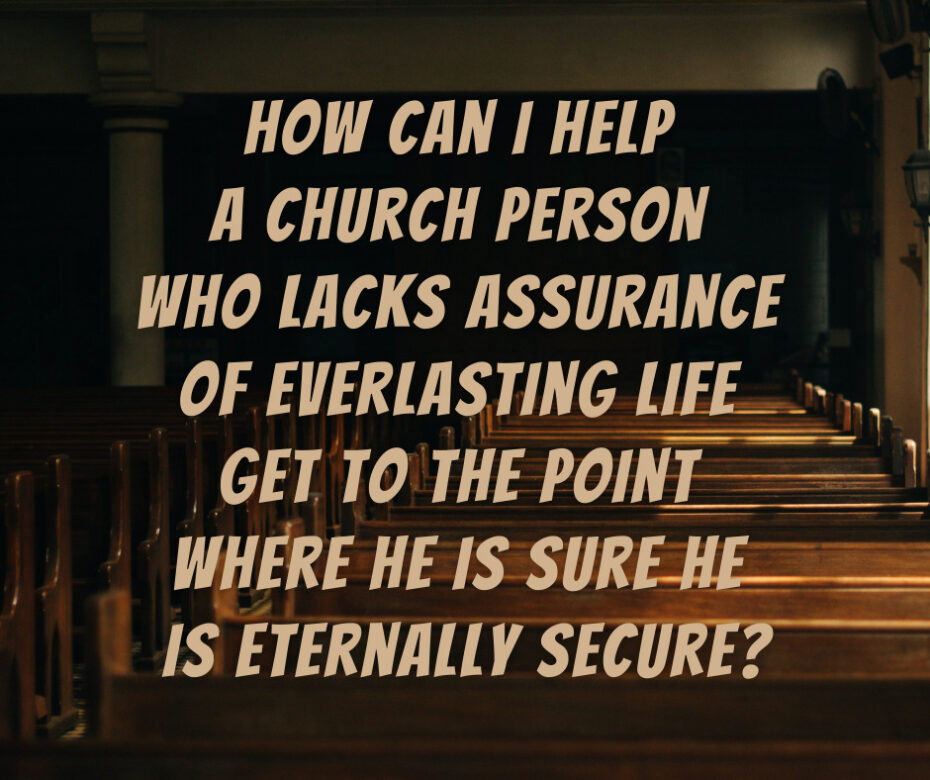A pastor asks a very important question:
I have been extremely blessed by the ministry of GES and the clarity you all teach with. I recently held a class at my church about eternal security and assurance, and my question is, how do you converse and disciple church members who think that it’s not good enough to just believe in Jesus and receive the free gift of eternal life?
It is not clear from this question whether he is dealing with people who do not believe in eternal security or with people who do, but who say that true faith is more than simply being convinced of the promise of life, but must include a desire to live a new life and a commitment to serve Christ.
Most of the second type of people do not actually believe in eternal security. They say that if a person who professes to believe in Christ does not persevere in faith and good works until death, then he will not make it into Christ’s kingdom. They might say that he proved that he was never born again in the first place. Or, as is becoming increasingly popular in some Calvinist circles, they can say that such a person had initial salvation but failed to persevere to gain final salvation.
In some ways it is a bit easier to deal with people who openly reject eternal security. But the issue is the same in both cases. We desire to show them that all who simply believe in the Lord Jesus for their eternal destiny have everlasting life that can never be lost.
Pastors have an advantage that others in congregations do not. They get to preach God’s Word to the congregation 45-50 times a year, and that is just counting sermons. If you add in Sunday school lessons, home Bible studies, and Sunday or Wednesday night messages, many pastors give well over a hundred messages a year.
All those messages are building blocks in the lives of the congregation. Paul said that we are to be transformed by the renewing of our minds (Rom 12:2). So, members of the congregation will be won over to the faith-alone position over time if they are Bereans who are open to the clear teaching of God’s Word (Acts 17:11).
But what about the rest of us?
Well, you might be teaching a Sunday school class or home Bible study. If so, you are influencing people through your clear teaching of God’s Word. (With your own children, you are teaching them God’s Word daily.)
In addition, we can all pray for people who do not see the truth of the faith-alone message. And, if they show a desire to talk about this issue, we can seek to persuade them in a loving way.
If I only had one conversation with someone, I would probably go to John 11:25-27 and Jesus’ question to Martha, “Do you believe this?” The person who does not believe that it is good enough to believe in Jesus for the gift of everlasting life would be in a bind. If he answers, “Yes, of course I believe what Jesus says,” then he is admitting that whoever lives and believes in Jesus will never die spiritually (John 11:26a). If he answers, “No, I don’t believe that,” then he is admitting that He does not believe what the Lord Jesus Christ says.
Of course, he might suggest that I have misinterpreted what the word believe means. Here he might say that it involves submission and commitment. But if so, we are making progress. Look how forced that translation is: “Are you submitted and committed to this?” What would that even mean? How can you be committed and submitted to this—that is, the statement that all who live and believe in Jesus will never die spiritually?
I might then take him to other verses in John that use the word believe. For example, in John 6:29, the Lord said, “This is the work of God, that you believe in Him whom He sent.” These people were submissive and committed to God, as their question in verse 28 shows. But they were not convinced that Jesus is the Messiah who guarantees everlasting life to all who believe in Him.
I might take him to John 20:31 and point out that all who believe that Jesus is the Christ, the Son of God, have everlasting life. The words believe that (pisteuō hoti in Greek) refer to being persuaded of the truth that Jesus is the Messiah, not to commitment, surrender, or obedience. Compare Martha’s answer in John 11:27. See also 1 John 5:1.
Once we get a person to examine what believe means, we are on a path that should lead him to assurance of everlasting life if he is open to the truth (Heb 11:6).
I came to faith in Christ when Warren Wilke kept quoting Eph 2:8-9 to me: “For by grace you have been saved through faith, and that not of yourselves; it is the gift of God, not of works, lest anyone should boast.” I do not recall him explaining what the word faith means. Over the course of five one-hour visits, I finally grasped that salvation is once and for all (“you have been saved”) when we believe in Christ for it. The idea that we had to do good works to get some future final salvation was ruled out by those two verses.
Keep it simple, saint. God’s Word and God’s Spirit do the work of persuasion. We just share the truth and leave the results up to God.


